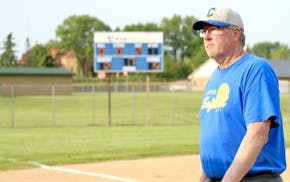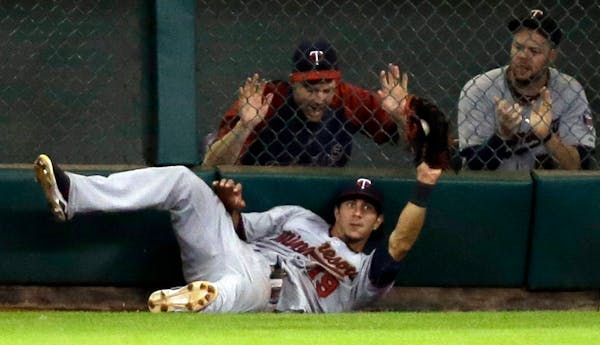Five years after Target Field opened, the Minnesota Twins for the first time are in danger of drawing fewer fans in a season than they did in the team's final year at the Metrodome.
After peaking at 3.2 million fans in Target Field's first year, the team's attendance has steadily fallen, with the Twins drawing 2.47 million fans last year. At the Metrodome, which is being torn down, the team drew 2.416 million fans and won a division championship in 2009, its last year in the multipurpose stadium.
This year, the Twins are still hoping to reach 2.5 million fans — with the boost of Minnesota hosting its first Major League Baseball All-Star Game in nearly 30 years. But the team acknowledged that it had sold 1.6 million tickets so far for this year, behind the 1.75 million tickets sold at this time a year ago.
"Shame on us," said Twins President David St. Peter, who had predicted that the team would level off at 2.7 million fans after Target Field's initial seasons. "I didn't anticipate losing 90-some games in 2012, and I certainly didn't anticipate losing 96 games in 2013."
In 2011, the team's second year at Target Field, the Twins narrowly missed losing 100 games, finishing with 99 losses. St. Peter said the three consecutive 90-loss seasons — even with a new $555 million publicly subsidized ballpark — is "going to take a toll."
Team officials also said that season tickets — a fuller barometer of interest in the Twins — have fallen sharply. After selling 25,000 season tickets in each of the first two years at Target Field, the total dropped to 23,000 in 2012 and 19,000 in 2013, and stands at 17,100 heading into this season's home opener on April 7. The team said it hoped to reach 17,500 season tickets for this year.
Still, the Minneapolis Regional Chamber of Commerce is briskly selling tickets for its annual season kickoff luncheon in April.
"There's a lot of buzz," said Todd Klingel, the chamber's president. "[But] they owe us a better team, and I'm glad Mr. St. Peter realizes it."
Klingel said the annual luncheon typically sells out; this year's event is charging $1,000 for a table of nine to have lunch with a Twins player or coach. He also said there is heavy interest again in the chamber's eight season tickets — in the second row, behind the visitor's dugout with a view of the downtown Minneapolis skyline.
"They're spending some money and trying to fix enough of the problems to actually be competitive," said Klingel.
For some Twins fans, that is hardly enough.
At his sports memorabilia store at Rosedale Mall, owner Ryan Marshall said interest in the team and the sale of Twins merchandise are both down. "They built this giant new stadium, and I go there probably 10 to 15 times a year and I spend all this money, and it just seems like they're putting it directly in their pocket" and not signing better players, Marshall said.
"It almost seems like a 'Scrooge effect.' They're like, 'Well, whatever. We know these people are going to come, so why reinvest it in players?' " he said. "The nostalgia of a new stadium is going to wear off, and then what do you got?"
St. Peter said it was unfair to compare current ticket sales to the Twins' last year at the Metrodome. He said that even with 2009 being the last year there — and with the Twins winning the division that year — the team still sold only 11,000 season tickets.
"If you're going to start to cite the Metrodome, you should cite average attendance in the Metrodome over a decade period — good years, bad years," he said. Comparing 2009 to the Twins ticket-sales issue now, said St. Peter, is "apples to oranges."
During a 10-year period at the Metrodome ending in 2004, with the Twins generally fielding losing teams and as the lobbying began for a new ballpark, the team never drew more than 1.9 million fans. The Dome's biggest attendance year — 3 million fans — was in 1988, the year after the Twins won the franchise's first World Series.
Former state Sen. Steve Kelley, a lead legislative proponent of the public-subsidy package to build Target Field, said he never believed that a new ballpark would automatically translate into a winning team. "There's no way to build a building that will guarantee success," said Kelley, who said he has only been to Target Field a "couple of times."
"Some legislators may have thought this will just sort of fix all problems," Kelley said of Target Field. But he said he and others always felt that the new ballpark simply "gives the Twins the best opportunity to compete [and that] then the responsibility's in their hands.
"If they continue to fall, I think that would be sad," Kelley said of the Twins' attendance figures, "but it might have more to do with broader things going on in society."
Former House Speaker Steve Sviggum, who was also a major political player in the Target Field subsidy package, said that without a new ballpark, the Pohlad family might have sold the team and its new owners might have moved it out of Minnesota.
"Would we have been driving to Milwaukee to watch baseball?" Sviggum added.
Season-ticket holder Jill McCallion, for one, is ready for the upcoming season. "I have nothing but optimism for the current season," she said. "I'd like to, obviously, see them as a .500 team — they certainly could [be]."
Mike Kaszuba • 612-673-4388

This St. Paul native now goes by Kandi Krush, and she body-slams her opponents in the ring
Brooklyn Park City Council member censured for 2nd time
Man agrees to 6-year sentence for fatally shooting Hopkins man on edge of downtown Minneapolis

